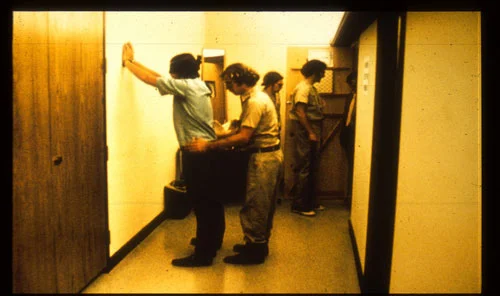Is Your Environment Empowering - or - Blocking You From Discovering Your True Identity and Destiny?
Is Your Environment Empowering
- or -
Blocking You From Discovering Your True Identity and Destiny?
“The most apparent thing that I noticed was how most of the people in this study derive their sense of identity and well-being from their immediate surroundings rather than from within themselves, and that’s why they broke down—just couldn’t stand the pressure—they had nothing within them to hold up against all of this.”
If you aren’t familiar with the Stanford Prison Experiment - then you may not recognize who Philip Zimbardo is (he was a professor at Stanford who developed and “led” this famous social psychology experiment in 1971).
Zimbardo wanted to see how good people might respond to an evil or toxic environment - and how the subjects in the study would respond to perceived power.
To do this - Zimbardo recruited Stanford students by offering them a modest amount of money - to participate in a 2 week long investigative study (these students were voluntarily participating in the study - and as such - they were free to leave at any time!).
The students who were ultimately chosen for this study were then randomly assigned to roles as either a prison guard - or a prisoner. Zimbardo also created a mock prison - to simulate the real life conditions that prisoners (and prison guards) would exist in.
Over the next 6 days - the students who remained in the study (which was the majority of them) - seemed to really internalize their roles in this prison.
The guards exerted control over the prisoners by engaging in abusive behavior - psychologically torturing them and ordering prisoners to intimidate and harass other prisoners who were being non-compliant (these students had been assessed and screened prior to the study to make sure that they were not predisposed to violence and abusive behavior - so their actions in the study were not consistent with their normal behavior - which demonstrated how influential this environment was on them).
The prisoners appeared depressed and experienced intense psychological distress and severe anxiety (this is where the voluntary nature of this study surprises me - as you assume that these students would leave the study when they started feeling depressed and anxious - but that’s not what happened).
As a side note - I know a lot of people who have stayed in really toxic relationships or environments - because they internalized their identity around their role in these relationships and environments - and even though this may have been really unhealthy for them - there was also some sense of security in the familiarity of their role or identity - as opposed to the fear and anxiety of the unknown (i.e., - an identity that was unfamiliar to them) - and they stayed because of this (familiarly and comfort are powerful forces - but they tend to get in the way of growth!!).
And Zimbardo himself - had taken on the role of Superintendent of the prison - which made it difficult for him to see beyond this role (between his role as a “scientist” and the superintendent - he was too subjectively enmeshed with his role and identity within the study - to objectively recognize how unsafe and dangerous the conditions had become).
It took Zimbardo’s girlfriend coming to visit him - and seeing how terrifying the conditions had become - and then begging him to stop the study - and even then - he only acquiesced to her plea after she threatened to break up with him.
The quote from Zimbardo at the top of this post - is in reflection of what he learned from this study.
His statement expresses how powerful our environment can be in shaping our identity - and persuading our behavior and attitudes.
There are other studies that come to similar conclusions regarding the power of our environment in shaping and molding our identity, performance, and how we view ourself (the labels we accept about ourselves, the limits we accept, what we are capable of; etc.).
There is the Pygmalion effect; Looking Glass Self theory; Expectancy theory (as it relates to priming - where our brain primes us to have the experience we expect by releasing neurochemicals that would be consistent with our expectation - before the experience even begins); and then once we have internalized an identity - we experience Cognitive Dissonance if/when we act out of alignment with our identity. *if you are interested in understanding more about any of these concepts - please message me!!
And this doesn’t even get into how our identity is shaped by our early childhood/family experiences - and how we look to our parents and immediate caregivers or support system to help us understand who we are, our place in the world, what we are good at (and sometimes the feedback we get as a kid - is that we are good at bad behavior - which reinforces that behavior as being part of our identity).
As I think about all of these environmental influences - and how powerful and influential they are in shaping our identity - it can be easy to come to the conclusion that our identity is largely out of our control - and is formed by powers and influences that are beyond our conscious awareness (giving us an identity that we didn’t necessarily choose!).
To make matters worse - once an identity is internalized - the behaviors and outcomes that flow from one’s identity - sit firmly under the control of our subconscious brain (this is why we engage in self defeating and self sabotaging patterns or self-fulfilling prophecies - where we make decisions that are not aligned with the person we want to be, the life we want to experience, and the type of relationships we want to create).
And if our behavior is largely driven by our subconscious brain - then how could we possibly change our identity so that it aligns with the person you want to be, the type of relationships you want to create, the quality of life you want to experience, and the purpose and impact that you want to establish?
Well - if we revisit the Zimbardo quote for a moment - their is a clue to what I believe the answer is.
In effect - Zimbardo states that the people who derived their identity and sense of well-being from their environment - as opposed to establishing their identity from within - couldn’t stand the pressure - and had nothing inside them to stand against the persuasive power and influence of their environment.
In other words: If you know who you are - and what you stand for - and your identity is established upon your core values, principles, and the virtues or character strengths that you choose to demonstrate in your work and relationships - than you are much more likely to stand up against the persuasive power of your environment.
And achieving an identity that is aligned with the values, principles, and the virtues and character strengths that point to the best version of yourself (your Authentic self - where your internal compass helps you to actualize the best version of yourself - from moment to moment in your roles as a spouse, parent, leader, in your relationship with yourself, etc.) - is the great challenge and epic journey that we all find ourself on!
When you can stand up and choose the person you want to be - even when your environment might be influencing you to do something - or be somebody - that you don’t want - that is true freedom!
Similarly - if you can get out of living in reactionary mode - where you are constantly responding to life (which is rarely going to give you your best outcome) - and start creating, shaping, and molding the types of moments you want to create, the types of interactions you want to have, and the type of person you want to be - this is how you create an Authentic life - actualizing your best self, your best relationships, and your best possible life experiences!
Ultimately - I see this quest as being a spiritual one - and when we discover our spiritual identity - it illuminates our unique purpose and destiny!!
And when we live in such a way - and create virtuous exchanges, interactions, and culture - it creates an enriched environment and space for others to discover their best self - and have the freedom to develop their Authentic identity.
You could call this the Bizarro Stanford Prison Experiment - where power is used for good - and environments are established with the goal of helping everyone to discover their unique purpose and destiny.
In a future post - I would love to identify some examples of companies, Church’s, families, and individuals that are Authentic exemplars - and explore what we can learn from them.
In the meantime - I would love to encourage everybody to think about the following:
How is your environment impacting how you see yourself?
How is it influencing your behavior and choices?
What environment are you creating in your interactions with others?
What expectations might you have of others that is shaping how they see themselves?
How are you using your power to influence others - and what words, labels, or roles might you be using to describe others - that then begins to define them?
Your answers to these questions have massively important and significant implications!!
And while I get that answering these questions may not be your ideal of fun - the results of answering these questions in a way that leads to your best self, your best life, and your best relationships - certainly could be a whole lot of fun!!
Plus - the ramifications of having great answers to these questions has incredible potential benefit for the people and causes that you care most about!
AG Thrive is passionate about helping people release identities that no longer fit them, or serve them well, in order to replace them with Authentic Identities.
These new identities are based on values, principles, virtues and a sense of purpose that aligns with their behavior, relationships and environment. It empowers them to step into their best self, best marriage, best family, best business, best community, etc.
This is what gets me excited!!
Please let me know if you have any questions, requests, or feedback - I would love to engage with you and go on this epic journey together!!

